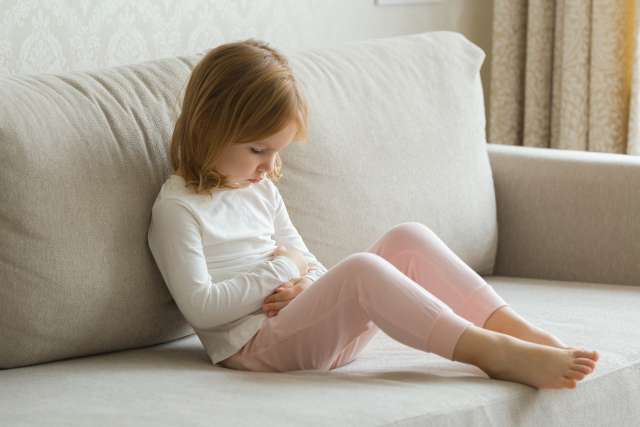Just like adults, kids’ digestive systems don’t always run smoothly. When things back up, it can lead to stomachaches and a painful time on the toilet. And for kids, painful bowel movements can turn into a vicious cycle: If pooping is painful, they avoid going to the bathroom, which then leads to more constipation and more pain.
The problem is incredibly common. An estimated one in 20 doctor visits for kids is related to constipation. Learn how to recognize the signs of constipation in your child and keep your kid’s digestive system moving.
What causes constipation in kids
A variety of causes can lead kids to have trouble pooping. Changes in diet or routine (such as traveling or starting a new daycare or school) can disrupt regular bowel function. In young children — especially those around potty-training age — withholding can be the issue.
Kids may withhold (deliberately ignore the need to poop) for different reasons. Sometimes, they’re just too busy playing or focused on whatever they’re doing and don’t want to take a break. Kids might also hold it in when they’re not home and don’t want to use an unfamiliar bathroom. Children who are already constipated and have pain when they try to poop will often avoid trying to go (which ultimately makes the problem worse).
If your toddler has no trouble pooping in a diaper but won’t do it in the potty, they may end up experiencing toilet training-related constipation. Kids who are resistant to toilet training may purposely hold their poop as a way of maintaining a sense of control during this stressful time.
Tricks for treating or preventing constipation in kids
The best way to deal with constipation in children is to prevent it from happening in the first place. While that’s not always possible, there are some steps you can take every day to help keep your child’s digestive system healthy. These include:
- Getting enough fiber in their diet: Fiber is what helps the body build soft, bulky, easy-to-pass poop. When your child’s diet lacks fiber, they may have stool that’s hard, dry and painful to push out. Fruits, vegetables, beans and whole grains are great sources of dietary fiber.
- Drinking plenty of fluids: Being dehydrated can, not surprisingly, also lead to hard, dry poop. It’s especially important to increase fluid intake when increasing fiber. The two work together to form healthy stools. Limit your child’s intake of sodas and other sugary beverages in favor of water.
- Exercising regularly: Being physically active is important for so many aspects of your child’s well-being. And when it comes to digestion, regular exercise helps encourage the intestines to push food through the system. Keeping food moving through the digestive system means it’s less likely to back up and cause constipation.
- Establishing good bathroom habits: Just as children need to be prompted to wear a coat or eat their vegetables, many also need a daily reminder to go to the bathroom. Younger children especially are easily distracted and may not recognize the signals their body is giving them that it’s time to poop. Set up regular times during the day (after meals is best) when your child can sit on the toilet without feeling rushed and let nature take its course.
If your child is already constipated, talk to your doctor about the best ways to get things moving again. They may recommend changes to your child’s diet or adding some gentle laxatives or stool softeners to their routine.
When to worry about constipation in children
If your child hasn’t pooped in a couple of days, don’t panic. But if you’ve already tried a variety of remedies, and they’re still having difficulty, it’s a good idea to call your pediatrician. Some other signs of constipation-related issues that are worth bringing to the doctor’s attention include:
- Belly pain that comes and goes
- Always straining when trying to poop
- Pain when passing stool
- Hard, dry poop
- Blood on the outside of the stool
For most children, simple diet and lifestyle changes are enough to get — and keep — their digestive systems moving and regular.



